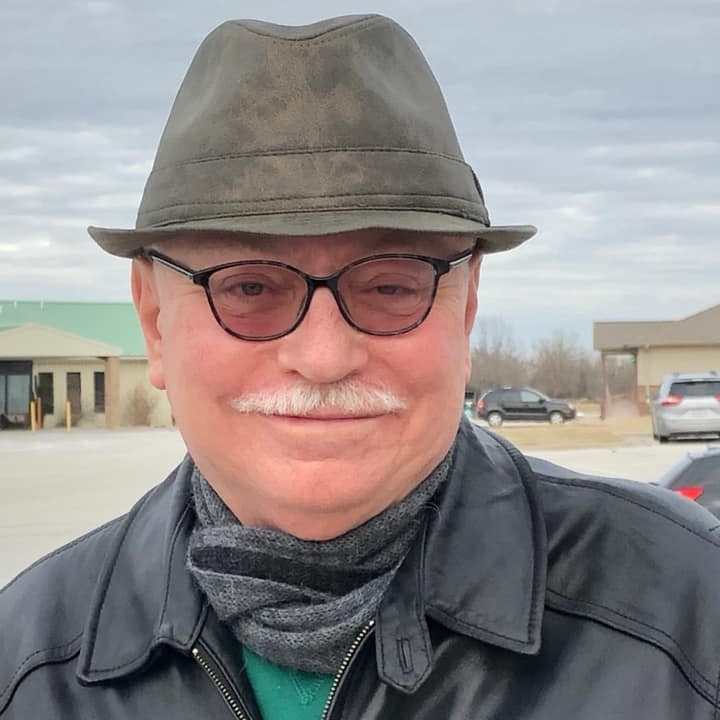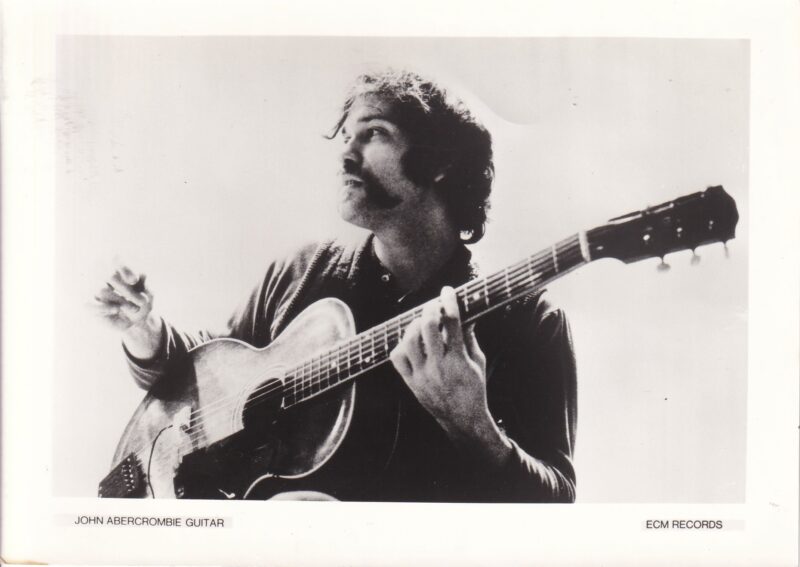#256 ジョン・アバークロンビー Part 2
John Abercrombie Part 2
ジョン・アバクロンビー・インタビュー
ウェイン・ゼイド @ミズーリ州セントルイス市 2000年2月13日
cover photo:©1979 Yasuhisa Yoneda 米田泰久
訳責:Kenny Inaoka 稲岡邦彌 (JazzTokyo)
Part 1 より続く;
♪ ルー・タバキンがプロデュースした『Direct Flight』
WZ: 秋吉敏子と結婚した・・・。
JA:そう、いろいろ繋がっているんだ。とにかく、ルーは僕ら3人の演奏テープを聴いて、「ああ、ジョー・パスはプロデュースしたくない。こっちをプロデュースしたいな。これは僕の好みだ」と言ったんだ。僕はとても嬉しくなってね、日本側もそのアイディアに乗ったんだ。ルーはスタジオの椅子に座ってパイプをくゆらせながら、「もう1テイクどうだい?」とか「もう1曲やってくれないか」って指図するだけで。だけどリクエストはすべてスタンダードなんだ。つまり、お仕着せのスタンダード曲のアルバムだったってわけさ。このアルバムはとても素晴らしいもので、今ではちょっとしたコレクターズ・アイテムになっているんだ。人に貸して回ってたら、ジャズ・アメリカというレーベルから再発売されたんだ。でも、オリジナル盤の裏には、キングストン・トリオみたいなスタイルで僕らの写真が載っているんんだ。僕はギターを抱えて、ピーターはドラムを持って、ジョージはベースを抱いて、みんな笑顔で、まじでヒステリックになったよ。
WZ:君はストライプのボタンダウンの襟付きシャツを着ていたよね。
JA:いや、ちょっと違うね。革ジャンを着ていたんだ。髪もまだたくさんあって、もみあげを伸ばして。でも、このレコードは気に入っているんだ。手作りの感触で、ちょっとファンキーだけど、それがいいんだ。日本の会社のために作ったものだけどね。僕は日本でレコーディングしたことはないし、他のミュージシャンほど日本に行ったこともないけれど、日本とは不思議なつながりがあるんだ。
あのアルバムを『Direct Flight』と名付けたのは皮肉だよね。日本には直行便では行けなかったのにね。つまり、彼らは格安チケットで僕らを日本に呼んだのでアラスカ経由という不思議なルートで、日本に着くまでに気の遠くなるような時間がかかったんだ。それで、冗談のようにこのささやかなレコードを作ったんだけど、僕らはそれが冗談だったとは認めたくはないんだ。アルバムのジャケットには、離陸するジェット機の写真が使われているけど。
WZ:君はもう何年もECMで録音していて、ECMとは非常に深い関係を持っているよね。日本のジャズ・レコード・ビジネスがどうなっているか知ってるよね? アメリカやヨーロッパのジャズ・レコード・ビジネスとは大きく違っていると思うかい?
JA:そうとは思わないね。ほとんど同じように動いていると思うけど。アメリカも日本も同じようなアプローチをしていると思う。ヨーロッパでのレコードの宣伝はそれほど目立っているとは思わないけど。アメリカでは、最近の『Jazziz』のようなカラフルなジャズ雑誌を見ると、広告がとても華やかになっているよね。
WZ: …あるいは『Jazz Times』とか?
JA:そう。まるでファッション雑誌のようでね。最初はそれほどではなかったんだけどね。『Downbeat 』も競うようになってね。どれもこれもファッション雑誌の『ヴォーグ』や『マドモアゼル』のように見える。よくわからないけど。なんだか、変な感じだね。雑誌のクオリティがとても洗練されてきて、それなりの写真家を使わないと、もう写真を雑誌に載せてもらえないかも知れないね。
WZ:あるいは、彼らのウェブ・ページね。今では、どんな雑誌も皆ウェブ・ページがあるんだ。
JA: そうだね。ところで、日本の雑誌を見たことがあるかい?『スイングジャーナル』みたいな分厚い雑誌を。何冊かあるんだけど、どれも似たような形式なんだ。どうやってあんなにたくさんの記事を雑誌に載せることができるのかわからないけど、とにかく、雑誌を開くとあらゆるスペースが確保されているんだ。途方もない広告ページ、途方もない数のレビュー、新譜や30年前に録音されたレコードの紹介があるんだ。
WZ:何か英語の雑誌はあるのかい?
JA: いや、すべて日本語だね。レーティング・システムを見てほしいんだけど、小さな男がいて、メガホンを持っているんだ。彼が手を上げていれば、4つ星のレビュー。お辞儀をしている場合は、さらに良い評価。それから、小さなワニがいるけど、これは良くない。だから、この雑誌を見て、彼らがレコードをどう評価しているかはわかるけど、レヴューについては何も読めないんだ。ヒステリックだね。見ていて楽しい。とても分厚い。ヨーロッパでは、マーケティング部門は、それほど強くプッシュしないんだね。多分、あまりプッシュするのはえげつないと考えてるんだろうね。
♪ YAMAHAのギターも楽しむ
WZ:繰り返しになるけど、ECMでの録音経験から判断して、彼らの制作水準は最高レベルですよね。
JA:とても高いです。
WZ: 僕らはここに座って、僕が25年前に買ったLPを見ているけど、まるで封を切ったばかりのようなフレッシュな音がする。
JA:そうだね、大切に保管していたようだね。僕のも見て欲しいな。
WZ:ところで、日本のレコード会社はアメリカのレコード会社よりも技術的な水準が高いという印象を持っているかい?
JA:そう思うね。日本人は何をするにしても、とにかく丁寧なんだね。電子機器やテープレコーダーなどいろいろ技術製品を考えてみてもね。質の高いものばかりだ。ほとんどのものが故障することがないからね。
WZ: 車は?
JA:そう、2台持っているけど。1台はスバルだ。
WZ:日本製だね。
JA:そう日本製。でも、古いメルセデス(87年製)も買ったばかりだ。どんなものでも長年使い込んできたものには、品質が保証されてると言えるね。ヤマハのギターを弾いたこともあるんだよ。日本人の知り合いが何人かいて、僕の生徒だったんだけどね。日本人の生徒が2人いたんだ。名前は何だったかな?ケンだったかな?2人ともとてもいいプレイヤーだった。ひとりはテツだった。彼があるとき、「ああ、ジョン、すごい!」と僕に言うんだ。「どうしてヤマハのギターを弾けるんだい?俺はヤマハのギターなんて弾けないよ、クソだ!」って。彼が言うには、スキー板もトラクターもミシンもテレビも、全部ヤマハが作ってると思ってるんだ。「なんでも作ってるんだよ。だからヤマハは弾くな」と彼は僕に言うんだ。でも、短い期間だったけどヤマハのギターは何本か弾いたことがる。ニューヨークの57番街で代理店をやっている女の子を知っていたんだ。彼女がいつも僕にモニター用のギターを提供してくれたのでね。そのつど試奏していたよ。
WZ: ヤマハのピアノにも音の良いのがあるよね。
JA:僕の家にもヤマハのピアノがある。大きな9フィート・ピアノで、とにかくゴージャスなんだ。キース・ジャレットやオスカー・ピーターソンや、クラシックの演奏家には向かないかも知れないけど、僕や、多くのジャズ・プレイヤーには向いていると思う。スタインウェイよりも手頃な価格だからね。だから、日本人の期待値は非常に高いと思う。技術的にも非常に高い水準を持っている。また、僕らが使っている製品の多くは日本で開発されているんだね。そして、僕が使った多くの機材もそうだね。僕はアメリカのメーカーのギターを弾くことが多いけど、日本製のギターを楽しまないというわけではないんだ。僕が使っているアクセサリーやエフェクター、リバーブなどは、ほとんどローランド社製だしね。ローランドは機器やシンセサイザーを製造している一大企業だよ。
WZ:ローランドは日本の企業かい?
JA:そうさ。彼らの製品は間違いなく最高だ。アメリカの製品の方がいいと言われることもありけど、僕はローランド製品の方が好きだね。使ってみたけど、日本製品の品質の方が好きだね。
日本人は、世界共通で使える製品を作っているような気がするね。修理もできるし、それほど難解でもない。とても賢明だね。
WZ:日本人の生徒が何人かいると言ってたけど。
JA:そう。
WZ:これはアメリカ国内でのことかい?
JA:そう、彼らはアメリカに来なければならなかったんだ。
WZ: 日本で何か教えたことはあるの?
JA:いや、日本ではないね。思い出そうとしているんだけれど、思い出せないなあ。ジョー・ロヴァーノと一緒に日本にいたことを最初は思い出せなかったので、間違いなく僕私の頭はいろんなことを忘れているんだろうね。でも、ニューヨークに住んでいた頃は、何人もの日本人の生徒がいたんだよ。今はそれほどでもないけど。
実は、ニューイングランド音楽院にひとり、日本人の生徒がいるんだ。彼は今学期から僕のところに来たばかりの新入生なので、名前を思い出せないなまあ。2週間後にまた行くときに、彼の名前を調べて覚えておかないと。
でも、ふたりの名前は覚えているね。ひとりはテツ、そしてもうひとりはカツだ。テツとカツ!?(Part 3に続く)
 ウェイン・ゼイド (Wayne Zade)
ウェイン・ゼイド (Wayne Zade)
1976年から2016年まで、ミズーリ州フルトンのウェストミンスター大学で英語の教授を務め、 ハーレム・ルネッサンスやジャズ、ブルース、詩など、アメリカ文学やジャズの講義を担当。 2000年頃から日本のジャズに興味を持ち、日本で演奏した多くのアメリカ人ジャズ・ミュージシャンや、アメリカで演奏した日本人ジャズ・ミュージシャンにインタビュー。これらのインタビューは、2023年に出版される『Nippon Soul: Jazz in Japan』という本にまとめられる予定。
♪ Part 1: https://jazztokyo.org/interviews/post-82389/
WZ: Who’s married to Toshiko Akiyoshi …
JA: Right, there are all these tie-ins. So, anyway, Lew heard some tapes of the three of us playing and he said, “Oh, I don’t want to produce Joe Pass, I’d rather produce this. This is more my cup of tea.” I was very pleased, and the Japanese went with the idea. All it consisted of was Lew was just sitting in the studio, smoking his pipe, and saying to us, “Why don’t you do another one? Do another one.” And it was all standard tunes. That was it–it had to be an album of standards. It’s a great little record, now it’s a little collectors’ item. I lent it around to people, and then it was re-released on a label called Jazz America. But on the original, there’s a picture of us on the back–kind of Kingston Trio style: I’m holding my guitar, Peter’s with his drum , George holding his bass, we’re all smiling–it’s really hysterical.
WZ: You’re wearing striped, button down collar shirts …
JA: No, not quite. I had a leather jacket on. Lots of hair and sideburns. But I like the record. It’s kind of homespun, and kind of funky, but I like that. And that was made for a Japanese company. So I’ve got these tie-ins with Japan, though I’ve never recorded in Japan, and I haven’t been to Japan as much as some other musicians, but there are all these weird little connections.
It’s interesting that we called that album Direct Flight–because that’s what we didn’t get when we went to .Japan. The people who brought us were trying to get us over there inexpensively, so we had to fly like through Nome–some very bizarre routing, and it took us forever to get there. So we did that little record as a joke, but we never admitted it was a joke. The album cover had this jet plane taking off.
WZ: You’ve recorded for ECM for many years now; you have an unusually abiding relationship with that label. Do you have a sense of how the jazz record business in Japan works? Is it much different from the jazz record business in the States or i11 Europe?
JA: I don’t think so, no. I think it pretty much works the same. I think that America and Japan approach things similarly. Europe, it seems to me, is not quite so hard sell, in terms of how they’re trying to promote the records. In this country, in America, it’s like–if you just look at today’s color jazz magazines, the ads are getting so glossy–I mean some of those magazines, like Jazziz .. .
WZ: … or Jazz Times?
JA: Yeah. They’re like fashion magazines. They didn’t start out that way. Down Beat’s having to compete. Everything looks like Vogue or Mademoiselle. I don’t know. It’s like, weird. They’ve taken on this very slick quality, and if you don’t have a real good photographer, you might not get in the magazine anymore.
WZ: Or on their web pages. The magazines all have web pages n0w.
JA: Yeah. Have you seen the magazines in Japan? These thick magazines, like Swing Journal’? There are a couple of them, and they’re all very similar in format. I don’t know how they manage to put so much stuff in a magazine, but you open it up and every little space is accounted for. There are millions of ads, millions of reviews, of new records, records that were recorded 30 years ago.
WZ: Are any of these in English?
JA: No, these are all in Japanese. You should see the ratings system. There’s a little guy, and he’s holding a megaphone. If he’s holding his hands up, it’s a four star review. And if he’s bowing, that’s even better. Then there’s a little alligator–which is not good! So you can look at these magazines, and know what they think of the records, but you can’t read anything about them. It’s hysterical. Fun to look at. Very thick. In Europe, the marketing departments just don’t push as hard, they’re not as hard sell. They probably think it’s too crass to do that.
WZ: Again, you record for ECM, and their standards of production are among the highest.
JA: They’re very high.
WZ: We’re sitting here looking at LPs that I’ve had for 25 years, and they sound like I’ve just opened them..
JA: Well, they look like you take care of them. You should see mine!
WZ: But is it your impression that the Japanese have higher technical standards than American record companies?
JA: I think so. It just seems that in whatever they do, there seems to be a lot of care taken. Think of so many things, technical things–electronic equipment, tape recorders. It’s just quality stuff. Most of it never breaks down.
WZ: Do you have a car?
JA: Well, I have two. One is a Subaru!
WZ: It’s Japanese.
JA: Japanese. But I also just bought an old Mercedes–an ’87. But in so many things I’ve owned over the years, the quality is there. And I’ve actually even played Yamaha guitars. I knew a couple of Japanese guys–they were my students. I had two Japanese students, but what were their names? Ken? Both very good players. Tetsu, Tetsu was one. He told me one time, “Oh, John, aw! How could you play Yamaha guitars? I could never play Yamaha–it’s shit!” He’s thinking they make skis, tractors, sewing machines, televisions, you know. They make everything, you know! So don’t play Yamaha, he was telling me. But I had a short bout with a Yamaha guitar, and actually I played a few of them. I knew a girl who was the representative in New York, on 57th Street. She kept giving me guitars to try. I kept trying them.
WZ: Some of the Yamaha pianos sound lovely.
JA: I have a Yamaha piano at.home. It’s a big one, a big nine-footer, and it’s gorgeous–for me, anyway. Maybe not for Keith Jarrett or Oscar Peterson, or somebody, or a classical musician, but for me, or a lot of jazz players. It’s more affordable, anyway, than a Steinway. So I think the Japanese expectations are very, very high; they have very high standards technically. Also, Japan is where a lot of stuff gets developed, a lot of the stuff we all use. And a lot of the equipment I used ! I mean, I do play guitars by American makers, I seem to prefer that, although that doesn’t mean I wouldn’t enjoy a Japanese guitar. But all the little bits and pieces I use, a lot of my little effect units, you know, the reverbs–most of it is from the Roland Corporation, which is a huge corporation that makes instruments and synthesizers.
WZ: And it’s a Japanese corporation?
JA: Yeah. Their stuff is absolutely the best. I prefer their things, although there’s American stuff that people say is better. And I’ve tried it, but I just like the quality of the Japanese stuff better.
The Japanese just seem to have a way of making things that you can use that are kind of universal. People can fix these things, and it’s not so esoteric. Very smart.
WZ: You mentioned having a couple of Japanese students.
JA: Yeah.
WZ: This was in the States?
JA: Yeah, they had to come to the States.
WZ: Have you done any teaching in Japan?
JA: No, not in Japan. I’m trying to remember, and I can’t. I couldn’t at first remember being in Japan with Joe Lovano, so obviously my mind forgot a lot of things. But I have had a number of Japanese students over the years, when I was living in New York. Not so much now.
I actually have one Japanese student at the New England Conservatory. I can’t remember his name now, because he’s a new student, he just started with me this semester. I’ll have to look his name up and remember who he is when I go back again, in a couple of weeks.
But two guys I remember. One was Tetsu, and the other was Katsu. Tetsu and Katsu!
 Wayne Zade
Wayne Zade
Wayne Zade was Professor of English at Westminster College in Fulton, Missouri, from 1976-2016. He taught courses in American Literature and jazz, including the Harlem Renaissance and Jazz, Blues, and Poetry. He became interested in jazz in Japan around the year 2000 and was able to interview many American jazz musicians who played in Japan and some Japanese jazz musicians who played in the U.S. These interviews will be collected in a book, Nippon Soul: Jazz in Japan, which will be published in 2023.

